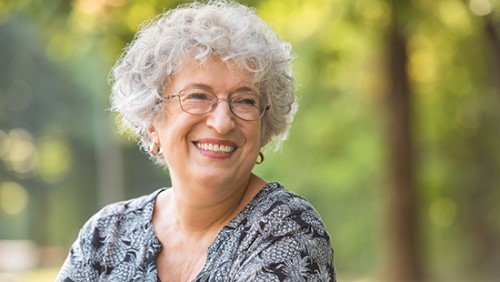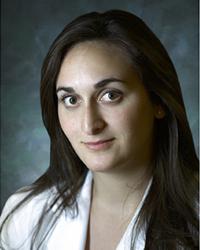Fuchs' Dystrophy

Fuchs' dystrophy causes the loss of the cells in the cornea that remove excess fluid from this thin, clear outer layer of the eye.
As more cells are lost, fluid builds up. The cornea becomes less transparent, resulting in blurry vision.
Its shape can also change, resulting in other vision problems. Fuchs' usually affects both eyes.
At University of Maryland Eye Associates, our faculty physicians provide expert care, ranging from corneal transplant surgery to medications for symptom relief, for this and other corneal diseases.
More common in women than in men, Fuchs' can be inherited or develop in people without a family history of the disease. Although vision problems usually don't appear until after age 50, Fuchs' dystrophy can affect people in their 30s and 40s.
Fuchs' Dystrophy Symptoms
Symptoms include:
- Eye pain
- Sensitivity or discomfort in bright light (photophobia)
- Foggy or blurred vision, at first only in the mornings
- Colored halos around lights
- Vision that gets worse throughout the day
Fuchs' Dystrophy Stages
There are two stages of Fuchs' dystrophy.
- Your vision is foggy or hazy in the mornings due to excess fluid buildup. This is because your eyes are still moist from sleep. Your vision improves as your eyes dry naturally throughout the day.
- Your eyes remain blurry all day from the excess fluid buildup that can't dry out during the day. Small blisters may also develop on your cornea. These will enlarge and burst, causing eye pain.
Treatment for Fuchs' Dystrophy
Ophthalmologists at University of Maryland Medical Center offer symptom and pain relief treatments for Fuchs' dystrophy. Eye drops or ointment that drains fluid from the cornea can help keep your eyes dry and vision clear. To reduce pain from blisters on the cornea, you may wear soft contact lenses or have surgery to make flaps that cover the sores.
The only cure for Fuchs' dystrophy is a corneal transplant, also called keratoplasty, for each eye. Donor corneas don't need to match your blood type so tissue for cornea transplants is usually readily available.
Advanced technologies allow our cornea specialists to replace only the affected layers of the cornea with new tissue, making this an outpatient procedure.
Make an Appointment
Learn more about Fuchs' dystrophy or make an appointment with one of our cornea specialists by calling 667-214-1111.


